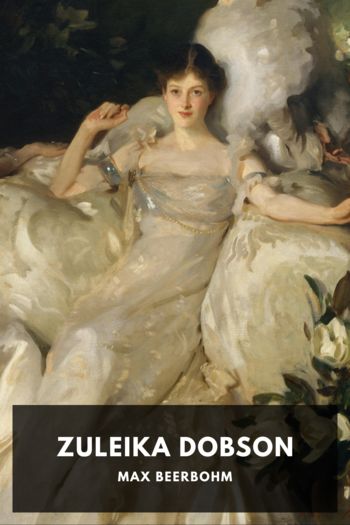The Works of Max Beerbohm - Max Beerbohm (electric book reader .txt) 📗

- Author: Max Beerbohm
Book online «The Works of Max Beerbohm - Max Beerbohm (electric book reader .txt) 📗». Author Max Beerbohm
“When recreant man
Meets lady’s wrath, etc. etc.”
So the story of the début was complete! Was ever a lady more inexorable, more ingenious, in her revenge? One can fancy the poor Antiguan going to the Baronet’s house next day with a bouquet of flowers and passionately abasing himself, craving her forgiveness. One can fancy the wounded vanity of the girl, her shame that people had mocked her for the disobedience of her suitor. Revenge, as her letter shows, became her one thought. She would strike him through his other love, the love of Thespis. “I have compelled you,” she wrote afterwards, in her bitter triumph, “to be a greater Fool than you made me.” She, then, it was that drove him to his public absurdity, she who insisted that he should never win her unless he sacrificed his dear longing for stage-laurels and actually pilloried himself upon the stage. The wig, the pantaloons, the snuffbox, the grin, were all conceived, I fancy, in her pitiless spite. It is possible that she did but say: “The more ridiculous you make yourself, the more hope for you.” But I do not believe that Mr. Coates, a man of no humour, conceived the means himself. They were surely hers.
It is terrible to think of the ambitious amateur in his bedroom, secretly practising hideous antics or gazing at his absurd apparel before a mirror. How loath must he have been to desecrate the lines he loved so dearly and had longed to declaim in all their beauty and their resonance! And then, what irony at the daily rehearsal! With how sad a smile must he have received the compliments of Mr. Dimonds on his fine performance, knowing how different it would all be “on the night!” Nothing could have steeled him to the ordeal but his great love. He must have wavered, had not the exaltation of his love protected him. But the jeers of the mob were music in his hearing, his wounds love-symbols. Then came the girl’s cruel contempt of his martyrdom.
Aphrodite, who has care of lovers, did not spare Miss Tylney Long. She made her love, a few months after, one who married her for her fortune and broke her heart. In years of misery the wayward girl worked out the penance of her unpardonable sin, dying, at length, in poverty and despair. Into the wounds of him who had so truly loved her was poured, after a space of fourteen years, the balsam of another love. On the 6th September 1823, at St. George’s, Hanover Square, Mr. Coates was married to Miss Anne Robinson, who was a faithful and devoted wife to him till he died.
Meanwhile, the rejected Romeo did not long repine. Two months after the tragedy at Bath, he was at Brighton, mingling with all the fashionable folk, and giving admirable recitations at routs. He was seen every day on the Parade, attired in an extravagant manner, very different to that he had adopted in Bath. A pale-blue surtout, tasselled Hessians, and a cocked hat were the most obvious items of his costume. He also affected a very curious tumbril, shaped like a shell and richly gilded. In this he used to drive around, every afternoon, amid the gapes of the populace. It is evident that, once having tasted the fruit of notoriety, he was loath to fall back on simpler fare. He had become a prey to the love of absurd ostentation. A lively example of dandyism unrestrained by taste, he parodied in his person the foibles of Mr. Brummell and the King. His diamonds and his equipage and other follies became the gossip of every newspaper in England. Nor did a day pass without the publication of some little rigmarole from his pen. Wherever there was a vacant theatre—were it in Cheltenham, Birmingham, or any other town—he would engage it for his productions. One night he would play his favourite part, Romeo, with reverence and ability. The next, he would repeat his first travesty in all its hideous harlequinade. Indeed, there can be little doubt that Mr. Coates, with his vile performances, must be held responsible for the decline of dramatic art in England and the invasion of the amateur. The sight of such folly, strutting unabashed, spoilt the prestige of the theatre. Today our stage is filled with tailors’-dummy heroes, with heroines who have real curls and can open and shut their eyes and, at a pinch, say “mamma” and “papa.” We must blame the Antiguan, I fear, for their existence. It was he—the rascal—who first spread that scenae sacra fames. Some say that he was a schemer and impostor, feigning eccentricity for his private ends. They are quite wrong; Mr. Coates was a very good man. He never made a penny out of his performances; he even lost many hundred pounds. Moreover, as his speeches before the curtain and his letters to the papers show, he took himself quite seriously. Only the insane take themselves quite seriously.
It was the unkindness of his love that maddened him. But he lived to be the lightest-hearted of lunatics and caused great amusement for many years. Whether we think of him in his relation to history or psychology, dandiacal or dramatic art, he is a salient, pathetic figure. That he is memorable for his defects, not for his qualities, I know. But Romeo, in the





Comments (0)